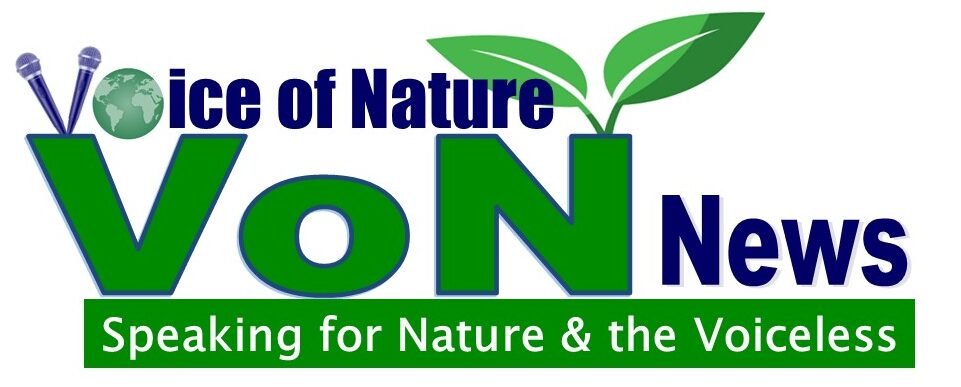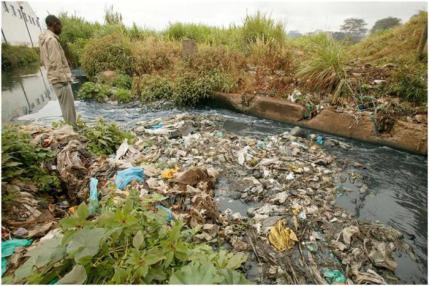There seem to have been a cold war between agents of the Ministry of Environment, Protection of Nature and Sustainable Development (MINEPDED) and dealers in plastics below 61 microns ever since April 24, 2014 when the Cameroon Government placed a ban on the production, importation and sale of non-biodegradable plastics in the country.

In what has turned out to be a typical cat and mouse game, these banned plastics are visibly still very much in circulation despite incessant sensitisation and repressive measures by the government. For instance statistics gathered from the Southwest Regional Delegation of MINDEPDED in the early months of 2016 indicated that over 2 million francs CFA has collected as fines with over 200 dealers detained, yet almost every retail shop in the country sells with these plastics on a daily bases.
While the government has successfully stopped the production of this category of plastics, the country’s borders remains porous given a lee way for the smuggling of these plastics from neighbouring countries, where production and circulation is still very much legalised.
Menchum Division in the Northwest Region of Cameroon is one of the key access routes through which these banned plastics get into Cameroon. This Division has three Subdivisions bordering Nigeria including Furu Awa Subdivision, Fungom Subdivision, and Menchum Valley Subdivision, which are so porous that people just stroll normally with the plastics into the country.
In an interview granted The Green Vision recently, the Menchum Divisional Delegate of Environment, Protection of Nature and Sustainable Development, Mr. Hyacinth Mboh, is really helpless with the status quo.
“It’s true we have banned plastics but our neighboring countries haven’t; Nigeria has not banned plastics. Menchum has three Subdivisions bordering Nigeria, which are completely porous. The staff strength is too small that one cannot place people at all of these places. That’s why I was telling the Ministry that if we can set up control posts in areas like that so that we can place two or three staff there to ensure that plastics don’t get into the country from those directions it will greatly help. We thought services like custom will help us but the situation is not very good. Some times even when you get there you won’t recognize it because it’s rapped in a container that you will not even know it’s plastics. The customs are the ones to search everything because we don’t have that legal right to stop vehicles, offload and charge. So it becomes a very complicated situation. Most of these plastics come in late in the night; sometimes at 1 am, 2 or 3am. We don’t have any control post. We expect that when they search, they can call for us to come get and register that this amount of plastics was seized by customs but we haven’t got any of such call so I don’t know if it’s complicity or what”, the Delegate narrated his plight.
Mr. Mboh said even repeated seizure and evacuation of the plastics seems to be yielding little or no fruit.
“ 2014 was the worst because that’s the year this plastic ban effectively started. We had a case; we got this lady with about 360kg of plastics and I had to follow up to make sure that it was seized and transferred to Bamenda but I was shock to see that the lady was still bent to get back to the same business despite such a huge loss. It created a lot of problem because many market people saw the Delegation of Environment as enemy to progress because this lady seemed to have been the main supplier of plastic throughout the division. You control today , in the night the continue with their business. When we seize, we gather and take to Bamenda but when you come back it seems you did nothing” he lamented.

The Delegate disclosed that the Minister of Environment had even sent a service note calling on him and other delegates to be more repressive, which to him is also risky.
“We are the one feeling the pinch on the ground. If I take every week say just two or three like that, my office will be hot and it will not really be easy on me because I stay with the people, my children and wife all live here with the people. They can use any means to get to me. I try as much as possible to sensitize and let the people collaborate with me such that they are even the people reporting to me that this or that person is in possession of plastics and I go and collect. Using force is not good but you ask yourself what is the result at the end of that?”, he questioned.
Anglophone Crises Weakens Repressive Measure against Plastic Dealers
Delegate Mboh, revealed , the aggressiveness with which repressive measures are intensified when the ban was placed has greatly reduced. He attributed it to the ongoing crises plaguing the two English Speaking Regions of the country.
“We have not really embarked on any seizure because of the prevailing socio-economic situation in the country. I will not want to stir up something that you may not be able to control but as of last year we seized up to 100kg of plastics, which are transported to Bda for onward transmission to Younde for certified companies that come and collect for recycling” Mr Mboh hinted.
He underscored the fact that they are not out to create problems any problem; that repressive measures only come in when the people resist. “Our objective is not to take people to court but to ensure that the plastic is controlled to the barest minimum”, he said.
Municipal Councils Sub Contracted to Combat Plastics Circulation
Meanwhile MINEPDED has resorted to collaborating with Municipal Councils in the fight against none biodegradable plastics .
“ Right now as we speak, Wum Council has FCFA 2 million to help in this plastic repression. In the days ahead, all the councils will be there because the markets belong to the council and they can better manage the process. Besides controlling circulation, the councils will employ youth and guys who will recover lithered plastics, wash and weigh them for financial returns so the plastics can be taking to Younde for companies to buy and recycle. So we are confident that if all councils in the country are involved in this process then we are sure to succeed with the ban”, the Delegate disclosed.
More Repression than Alternative?
As to why the Government has not been able to put in place a sustainable alternative for her citizens fours years after ban, Delegate Mboh said there are alternatives.
“The problem with us is that we are very head strong. Each time I go to the market they say we don’t have alternative I show them these are other alternatives. The ban is on plastics less than 61 microns so anything greater than 61 microns becomes an alternative and is what you should use. Besides these, we have leaves” , he opined.
The delegate explained that the reason why the Ministry is banning plastics less than 61 Microns is because they lither the environment, and are also used to put hot food, which may induce cancer. He said plastics above 61 microns, are thicker and can be reused.
What about Sachet and other plastics Sources?
As to why the government is focusing only on plastics below 61 microns while biscuit, milk, whisky and other sachet plastics also lither the environment, the Delegate stated that the minister is putting in place a plan to also track those ones down. He said Companies producing sachet products will have to apply for environmental permits within which they will stipulate clearly how these plastics sources will be recovered after use.
Mr. Mboh indicated that the Ministry has a long list of persons and companies that have applied for environmental permits. For water distribution companies, he said they do have and environmental permits and are already mapping ways to track down their plastics.
“Tangui and Supermont have obtained environmental permits and are already getting into a memorandum of understanding with HYSACAM for the collection of plastics. They are also putting in place a collection mechanism such that if you bring four empty bottles, they will give you one free bottle of water” he revealed.
The Divisional Delegate for Menchum surmised that in the days ahead, maximum success will be recorded regarding the management of waste plastics as the government machines grinds slowly but surely.
By. B. Shancho Ndimuh








I found your site from Google as well as I have to claim it was a terrific
locate. Many thanks!